Ballina, New South Wales
Ballina (/bælɪnə/)[3] is a town in the Northern Rivers region of New South Wales, Australia, and the seat of the Ballina Shire local government area. It lies 740 km (460 mi) north of Sydney and 185 km (115 mi) south of Brisbane. Ballina's urban population at the end of 2021 was 46,190.[4] The town lies on the Richmond River and serves as a gateway to Byron Bay.
| Ballina New South Wales | |||||||||
|---|---|---|---|---|---|---|---|---|---|
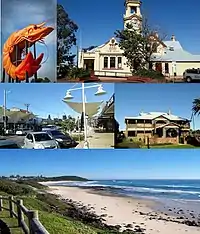 Clockwise from top left: The Big Prawn, Ballina Court House, Ballina Manor, Shelly Beach, River Street Mall. | |||||||||
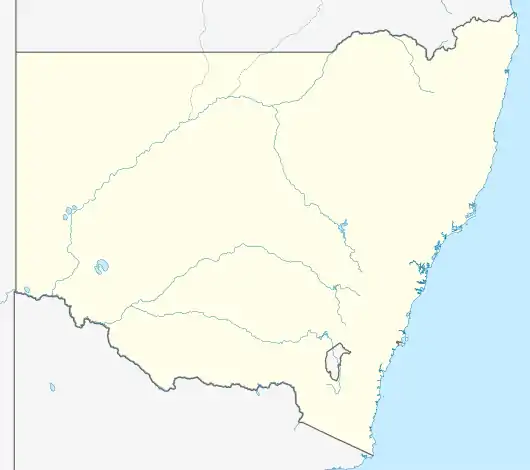 Ballina | |||||||||
| Coordinates | 28°51′49″S 153°31′58″E | ||||||||
| Population | 46,190 (2021)[1] | ||||||||
| Established | 1840s | ||||||||
| Postcode(s) | 2478 | ||||||||
| Elevation | 1.3 m (4 ft)[2] | ||||||||
| Location | |||||||||
| LGA(s) | Ballina Shire | ||||||||
| State electorate(s) | Ballina | ||||||||
| Federal division(s) | Richmond | ||||||||
| |||||||||
History
Ballina is located on the ancestral land of the Bundjalung people, the original inhabitants. Archaeological evidence demonstrates Bundjalung occupation of the region for at least 6000 years.[5] One view suggests that the name Ballina comes from corruption of a clan name for the Bullina band of the Arakwal.[6] It has been argued that in this tribe's Bundjalung language, bullinah meant "place of many oysters". This theory argues that the Aboriginal name reminded the predominantly Irish settlers of "Ballina", so the name's origin could be an accidental or deliberate corruption. Another view is that town's name comes from the Irish placename Ballina (Béal an Átha, "mouth of the ford"), which is found in several parts of Ireland.[7]
Ballina was established in the 1840s on the northern shore of the Richmond River, 20 kilometres south of Cape Byron, Australia's most easterly point. HMS Rainbow, commanded by Capt. Henry Rous, first sailed into the Richmond River in 1828, followed by overland settlers from the Clarence River. In 1842, more settlers arrived on a ship called Sally, forming a settlement at what is now East Ballina on Shaws Bay.[7] A lighthouse, Richmond River Light, was first constructed in Ballina in 1866, which served as a significant port in the region. The temporary lighthouse was replaced with the current one, designed by James Barnet, in 1879, and first lit in 1880. It is still active.[8] A branch railway line connected Ballina with the Murwillumbah railway line railway at Booyong. The line was opened on 24 August 1930 and closed on 12 January 1949.[9]
Landfalls
Ballina has a number of famous "landfalls" associated with it. In 1928, Charles Kingsford Smith's plane, the Southern Cross, crossed the coast over Ballina after its epic journey across the Pacific Ocean.[10] Ballina had a festival associated with the event during the 1970s and 1980s, and a school in East Ballina bears the name "Southern Cross".
In 1973, the Las Balsas rafts were towed into Ballina by fishing trawlers after their journey from Ecuador.[11] One of the rafts is preserved in the Ballina Naval and Maritime Museum.[12] They had planned to arrive in Mooloolaba in Queensland, but currents forced them off their course. Their journey was almost twice as long as the Kon-Tiki expeditions of 1947 and proved that people could have travelled across the Pacific in ancient times.
Heritage listings
Ballina has a number of heritage-listed sites, including:
Location
It is approximately 700 km (435 mi) north of Sydney and 160 km (99 mi) south of Brisbane. Ballina is a coastal town and is connected to the Pacific Highway which now bypasses it.
The Richmond River was an important transport route for the region for the first 100 years after settlement. The river and its estuaries abound with marine wildlife and provide for recreational fishing and water sports.
Demographics
The population of Ballina township was 18,532 at the 2021 Census [14] (representing 40 percent of the Ballina Shire population of 46,296). [15] The urban area had a population of 46,190, which includes Lennox Head and other suburban areas.[1][16]
Aboriginal and Torres Strait Islander people made up 3.3% of the population; compared with the national and state average of 2.9%.[17]
The most common ancestries in the area were English 31.2%, Australian 28.3%, Irish 10.9%, Scottish 8.7% and German 3.2%. 81.0% of people were born in Australia. The next most common countries of birth were England 3.4%, New Zealand 1.7%, Scotland 0.5% and South Africa 0.4%. 13.3% of people had both parents born overseas. 88.7% of people only spoke English at home.[17]
The most common responses for religion in the area were No Religion 30.2%, Catholic 23.0% and Anglican 19.6%.[17]
Economy
The median household income was estimated to be A$1,093 per week; with the median mortgage repayments estimated at A$1,733 per month; and median rent estimated at A$345 per week. The average number of motor vehicles was 1.6 per dwelling.[17]
Ballina serves as a tourism gateway to the close by destinations of Lismore and Byron Bay. The town has access to several beaches, such as Shelley's Beach, and to historical sites such as the Ballina Manor and the Ballina Naval and Maritime Museum, however its most famous landmark is undoubtedly the 'Big Prawn'.
The Big Prawn
_-_2009.jpg.webp)
Ballina is home to the world's largest prawn model (made of concrete and fibreglass).[18][19] On 24 September 2009, Ballina Shire Council voted to allow the demolition of the Big Prawn,[20] but this permission was never acted upon. Bunnings Warehouse purchased the site and refurbished the Prawn as part of the redevelopment. The Prawn now sits on a stand next to the entrance of the Bunnings Warehouse car park.[21][22] In March 2018, Google Maps' facial recognition software blurred out the facial area of the Prawn, first noticed on Reddit Australia,[23] and later reported in The Sydney Morning Herald.[24]
Climate
The town of Ballina experiences a humid subtropical climate (Koppen Cfa), typical of the central part of Australia's eastern coast. Summers are sultry, humid and rainy, with approximately 40% of the town's total annual precipitation occurring from December to March, with March being the wettest month of the year, receiving an average of 215.6 mm (8.488 in) of precipitation. Ballina's annual precipitation total observes a considerably higher concentration in the first half of the year (January–June) than the second half of the year (July–December). Ballina's wetness is due to the town's coastal location and proximity to Cape Byron, the easternmost point in Australia, which means that exposure to moisture-laden frontal systems that develop throughout the year in the Tasman Sea follows accordingly. Ballina experiences a copious 1,781.4 mm (70.1 in) of precipitation annually, which is one of the highest annual precipitation levels to be found along the eastern coast of Australia south of the tropical coast of northern Queensland. The all-time highest and lowest temperatures ever recorded in the town are 42.0 °C (107.6 °F) and −2.0 °C (28.4 °F) on 12 January 2002 and 17 June 1999 respectively.
| Climate data for Ballina Byron Gateway Airport, New South Wales, Australia (1992–present normals and extremes); 1 m AMSL | |||||||||||||
|---|---|---|---|---|---|---|---|---|---|---|---|---|---|
| Month | Jan | Feb | Mar | Apr | May | Jun | Jul | Aug | Sep | Oct | Nov | Dec | Year |
| Record high °C (°F) | 42.0 (107.6) |
41.0 (105.8) |
36.3 (97.3) |
32.6 (90.7) |
30.0 (86.0) |
28.0 (82.4) |
28.7 (83.7) |
36.7 (98.1) |
38.2 (100.8) |
37.0 (98.6) |
38.1 (100.6) |
40.0 (104.0) |
42.0 (107.6) |
| Mean maximum °C (°F) | 31.1 (88.0) |
30.7 (87.3) |
29.4 (84.9) |
27.4 (81.3) |
25.0 (77.0) |
23.0 (73.4) |
23.0 (73.4) |
25.0 (77.0) |
27.0 (80.6) |
29.0 (84.2) |
30.0 (86.0) |
31.0 (87.8) |
31.1 (88.0) |
| Average high °C (°F) | 28.4 (83.1) |
28.1 (82.6) |
27.1 (80.8) |
25.0 (77.0) |
22.6 (72.7) |
20.3 (68.5) |
20.1 (68.2) |
21.4 (70.5) |
23.6 (74.5) |
24.9 (76.8) |
26.3 (79.3) |
27.6 (81.7) |
24.6 (76.3) |
| Daily mean °C (°F) | 24.1 (75.4) |
23.9 (75.0) |
22.8 (73.0) |
20.2 (68.4) |
17.4 (63.3) |
15.2 (59.4) |
14.4 (57.9) |
15.1 (59.2) |
17.6 (63.7) |
19.5 (67.1) |
21.5 (70.7) |
23.0 (73.4) |
19.6 (67.2) |
| Average low °C (°F) | 19.8 (67.6) |
19.7 (67.5) |
18.5 (65.3) |
15.4 (59.7) |
12.1 (53.8) |
10.0 (50.0) |
8.7 (47.7) |
8.8 (47.8) |
11.5 (52.7) |
14.1 (57.4) |
16.6 (61.9) |
18.4 (65.1) |
14.5 (58.0) |
| Mean minimum °C (°F) | 16.9 (62.4) |
16.5 (61.7) |
15.0 (59.0) |
12.0 (53.6) |
7.8 (46.0) |
5.1 (41.2) |
4.0 (39.2) |
4.5 (40.1) |
7.0 (44.6) |
9.9 (49.8) |
13.0 (55.4) |
14.5 (58.1) |
4.0 (39.2) |
| Record low °C (°F) | 12.2 (54.0) |
13.2 (55.8) |
11.0 (51.8) |
5.9 (42.6) |
2.0 (35.6) |
−2.0 (28.4) |
0.0 (32.0) |
1.0 (33.8) |
0.4 (32.7) |
4.2 (39.6) |
7.0 (44.6) |
9.3 (48.7) |
−2.0 (28.4) |
| Average rainfall mm (inches) | 169.8 (6.69) |
224.0 (8.82) |
231.9 (9.13) |
183.2 (7.21) |
154.4 (6.08) |
201.5 (7.93) |
107.8 (4.24) |
77.7 (3.06) |
63.9 (2.52) |
100.6 (3.96) |
118.2 (4.65) |
148.4 (5.84) |
1,781.4 (70.13) |
| Average rainy days (≥ 1.0 mm) | 10.4 | 12.6 | 14.6 | 11.9 | 11.6 | 10.6 | 8.4 | 6.7 | 6.0 | 8.7 | 9.2 | 9.7 | 120.4 |
| Average relative humidity (%) | 70.5 | 73.0 | 73.5 | 70.0 | 69.5 | 68.5 | 65.5 | 60.5 | 61.0 | 64.0 | 68.5 | 67.0 | 67.6 |
| Average dew point °C (°F) | 19.6 (67.3) |
19.8 (67.6) |
18.6 (65.5) |
16.2 (61.2) |
13.4 (56.1) |
10.9 (51.6) |
9.8 (49.6) |
9.8 (49.6) |
12.3 (54.1) |
14.6 (58.3) |
16.7 (62.1) |
18.1 (64.6) |
15.0 (59.0) |
| Source: Australian Bureau of Meteorology (temperature, precipitation, humidity- 1992-present normals and extremes)[25] | |||||||||||||
Media
The Northern Rivers Echo is a free weekly community newspaper with 27,000 copies distributed to Lismore, Alstonville, Wollongbar, Ballina, Casino, Nimbin and Evans Head. The Northern Star is a tabloid newspaper based in Lismore. It covers the region from Casino to Ballina and up to Murwillimbah and Byron Bay, covering a population of several hundred thousand.
Ballina receives TV channels from SBS and ABC and the regional affiliates of Seven, Nine and WIN Television’s 10 Northern NSW.
The commercial radio stations in the area are Triple Z (Hit Music) and 2LM 900 AM. Both are run by Broadcast Operations Group. The community radio station is Paradise FM 101.9.[26] Other radio stations are Triple J 96.1 FM, ABC Radio National 96.9 FM, ABC Classic FM 95.3 and ABC North Coast 94.5 FM.
Facilities
There are four high schools in the town (Emmanuel Anglican College, Richmond Christian College, Ballina Coast High School and Xavier Catholic College), five primary schools (Ballina Public School, Emmanuel Anglican College, Holy Family Catholic Primary School, Richmond Christian College, St. Francis Xavier Primary School and Southern Cross School), a hospital and aged care facilities.
Transport
Ballina bypass
The Ballina bypass project upgraded 12.4 km of dual carriageway road, extending from south of Ballina at the intersection of the Bruxner and Pacific highways to north of Ballina at the intersection with Ross Lane at Tintenbar. Twelve kilometres of local roads were also upgraded.[27]
Early works started in April 2008 and substantial works on 16 June 2008. The Cumbalum to Ross Lane section opened in 2011[28] (the bypass was extended an extra 0.5 km to allow for a better connection to the Tintenbar to Ewingsdale Project) with full completion in mid-2012. The project had its final traffic switch opened to the public in April 2012, allowing for separation of the Pacific Highway and the Bruxner Highway traffic.
Airport
Ballina Byron Gateway Airport is the region's main airport, located on Southern Cross Drive and 5 km (3 mi) from the Ballina CBD. It has links to Newcastle, Melbourne and Sydney with FlyPelican, Jetstar, Rex Airlines and Virgin Australia operating services. The airport is a 30-minute road trip to Byron Bay and 40 minutes to Lismore. In 2005 Ballina Airport was renamed the Ballina Byron Gateway airport in a bid to attract more people to the area.
Sports and recreation
The Ballina Seagulls is the local rugby league club that competes in the Northern Rivers Regional Rugby League competition.
The Ballina Seahorses is the rugby union club that competes in the Far North Coast Rugby zone.
The Ballina Bombers is the Australian rules football club that competes in the Queensland Football Association Division 2 South
There is also a cricket competition with clubs such as the Ballina Bears and Tintenbar-East Ballina competing at both the district and regional (LJ Hooker League) level.
Notable people
- Mitchell Aubusson, Sydney Roosters NRL player
- Simon Baker, actor
- Dustin Clare, actor
- Nathan Crosswell, basketball player
- Declan Curran, rugby union player
- Dustin Dollin, professional skateboarder
- George Martin, mayor of Ballina
- Hunter Poon, cricketer
- Kerry Saxby-Junna,[29] Saxby competed with the Ballina Athletic Club
Twin cities
Ballina is twinned with:[30]
- Ballina, County Mayo, Ireland
- Matamata-Piako District, Waikato, New Zealand
Gallery
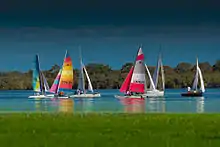 Boats on the Richmond River at Ballina
Boats on the Richmond River at Ballina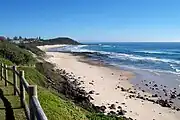 Ballina beaches
Ballina beaches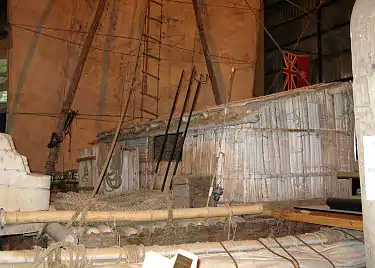 The Las Balsa raft at the Ballina Naval and Maritime Museum
The Las Balsa raft at the Ballina Naval and Maritime Museum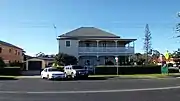 Riversleigh, Ballina
Riversleigh, Ballina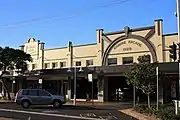 Wigmore Arcade
Wigmore Arcade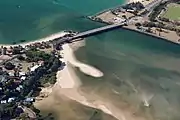 Missingham Bridge crossing North Creek from Ballina to East Ballina.
Missingham Bridge crossing North Creek from Ballina to East Ballina.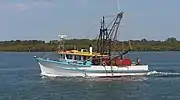 Richmond River Prawn Trawler
Richmond River Prawn Trawler
See also
References
- "Census 2021". Australian Bureau of Statistics. Australian Bureau of Statistics. 2023. Retrieved 15 February 2023. Ballina Significant Urban Area Population.
- "Ballina Airport AWS". Climate Averages for Australian Sites. Bureau of Meteorology. Retrieved 24 November 2006.
- Macquarie Dictionary (4th ed.). Melbourne, Australia: The Macquarie Library Pty Ltd. 2005. ISBN 1-876429-14-3.
- "2021 Ballina, Census All persons QuickStats | Australian Bureau of Statistics". www.abs.gov.au. Retrieved 15 February 2023.
- Council, Ballina Shire (24 August 2007). "Aboriginal culture and heritage". Ballina Shire Council. Retrieved 13 July 2021.
- "Arakwal (NSW)". www.samuseum.sa.gov.au. Retrieved 13 July 2021.
- "Ballina | New South Wales, Australia". Encyclopedia Britannica. Retrieved 14 July 2021.
- "The Richmond River Lighthouse". Lighthouses of New South Wales. Lighthouses of Australia Inc.
- Hagarty, D. The Booyong-Ballina Branch Line. Australian Railway Historical Society Bulletin, June 1953, pp. 65–68
- Kingsford-Smith, Charles; C. T. P. Ulm (1928). Story of "Southern Cross" Trans-Pacific Flight, 1928. Sydney: Penlington and Somerville.
- "Ballina Naval & Maritime Museum". bigvolcano.com.au. Ballina Naval & Maritime Museum. Archived from the original on 4 October 2006. Retrieved 3 November 2006.
- "Las Balsa Expedition". Ballina Naval and Maritime Museum. Retrieved 28 December 2015.
- "Brundah". New South Wales State Heritage Register. Department of Planning & Environment. H00194. Retrieved 18 May 2018.
 Text is licensed by State of New South Wales (Department of Planning and Environment) under CC-BY 4.0 licence.
Text is licensed by State of New South Wales (Department of Planning and Environment) under CC-BY 4.0 licence. - "2021 Ballina, Census All persons QuickStats | Australian Bureau of Statistics". www.abs.gov.au. Retrieved 15 February 2023.
- "2021 Ballina, Census All persons QuickStats | Australian Bureau of Statistics". www.abs.gov.au. Retrieved 15 February 2023.
- The Australian Bureau of Statistics' 2016 "significant urban area" (SUA) 1003 Ballina comprises two level-2 statistical areas (SA2s): 112011236 Ballina, and 112011242 Lennox Head - Skennars Head. Together they contain the populated centres of Ballina, Lennox Head, Lennox Head West, and Skennars Head, but exclude nearby inland towns Tintenbar and Cumbalum. The latter towns are contained in a separate SA2 112011237 Ballina Region. (ABS Maps
- Australian Bureau of Statistics (27 June 2017). "Ballina (Significant Urban Area)". 2016 Census QuickStats. Retrieved 30 November 2017.
- "Ballina". Destination NSW. Retrieved 11 November 2013.
- Hayward, Philip (30 April 2023). "Ballina's Big Prawn, local fishing heritage and place branding". Journal of Marine and Island Cultures. 12 (1). doi:10.21463/jmic.2023.12.1.05. ISSN 2212-6821.
- Stolz, Greg (25 September 2009). "Ballina's Big Prawn may move to Gold Coast". The Courier-Mail. Retrieved 23 December 2012.
- Turnbull, Samantha (7 November 2011). "Long live the Big Prawn". ABC News. Retrieved 23 December 2012.
- "Ballina Bunnings? $21.3 million. The Big Prawn? Priceless". The Northern Star. 7 October 2014. Retrieved 19 January 2017.
- "Google street view has blurred the face of Ballina's Big Prawn. Privacy first! • r/australia". reddit. Retrieved 4 March 2018.
- "Google facial recognition blurs out the Big Prawn" by Cole Latimer, The Sydney Morning Herald, 2 March 2018
- "Ballina Byron Gateway Airport, NSW Climate (1992-present normals and extremes)". Australian Bureau of Meteorology. Retrieved 7 May 2022.
- "Paradise FM 101.9". Community Broadcasting Organisation of Australia, cbaa.org. Retrieved 17 December 2018.
- Ballina Bypass Roads & Traffic Authority
- O'Neill, Kate (29 November 2011). "Ballina quiet as bypass opens". Northern Star. Retrieved 26 December 2019.
- Saxby-Junna, Kerry at the International Association of Athletics Federations
- "Sister City Agreement". ballina.nsw.gov.au. Archived from the original on 31 August 2007. Retrieved 10 July 2009.
External links
 Media related to Ballina, New South Wales at Wikimedia Commons
Media related to Ballina, New South Wales at Wikimedia Commons- Ballina Shire Council